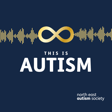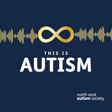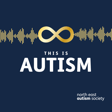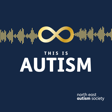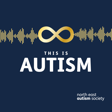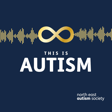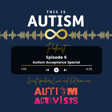Become a Creator today!Start creating today - Share your story with the world!
Start for free
00:00:00
00:00:01

10. Early support
Research shows that getting the right support early on can make a big difference to a child’s experiences at school and their mental health further down the line.
However, hundreds of thousands of children are currently on the waiting lists for an autism diagnosis, with their families often having to cope by themselves while they wait.
In conversation with Kerrie Highcock, Family Development Manager at NEAS, Dr Helen Leonard and Mum, Lyndsey Morgan, explore how the process works, what parents can do, and why early support is so important.
Find out more about our Little Stars appeal - www.ne-as.org.uk/little-stars
Transcript
00:00:05
Speaker
putting the right place, giving the right tools, giving the right education. And he's thriving now, really. I think mums and dads and you do you do have that kind of sixth sense. As well, deep down, you know, there's something going on, but you're not always sure what. Hello and welcome. to This is Autism, the podcast from the North East Autism Society. My name is Kerry Highcock and I'm the Family Development Manager at the charity. Today, we're going to be talking about the importance of early support for autistic children with Dr Helen Leonard and Lindsay Morgan.
00:00:34
Speaker
Helen is a consultant in pediatric neurodisability at the Greater North Children's Hospital and Lindsay is mum to two autistic children, Rosie 12 and Ralph aged 8. Research shows that getting the right support early on can make a big difference to a child's experiences at school and their mental health further down the line. However, hundreds and thousands of children are currently on the waiting and list for an autism diagnosis with their families often having to cope by themselves while they wait. So today we're going to be exploring how the process works, what parents can do and why early support is so important. So thank you so much for joining us, Helen and Lindsay.
00:01:12
Speaker
So Helen, I'm gonna start with you first. Can you tell us what does the diagnostic process look like for preschoolers? Hi, Kerry. It varies slightly depending which area you're in, but the the core, the essentials are all the same. It's a mixture of gathering information from people who know the child well, so mainly parents, family, guardians, whoever the child's with.
00:01:40
Speaker
and if we can, nursery or school staff who see a lot of them as well. and And then also some direct observations of the child to make sure that what people are telling us about them is in keeping with what we actually see as well. And I would say nearly all of the time, you know parents and nursery workers are spot on. Occasionally, there are differences and then we have to dig in a bit deeper and find out what's going on. But most of the time, those things match up.
00:02:13
Speaker
And if we have enough information from our observations of the child, from the information we've gathered from family and or nursery, and and it all matches up, we look at that information against the diagnostic criteria for autism. Some people use DSM criteria, some people use ICD-11, they're very similar now.
00:02:37
Speaker
But does all the information about the differences that child's showing or the difficulties they're having match up with criteria? And do we have the evidence that they fu fulfill those criteria? and And that's how we make a diagnosis. Often, for me, the observations are just informal.
00:02:54
Speaker
So the very young children that come in, it's often very apparent just watching them play in clinic, that maybe there's a lot of body mannerisms such as flapping and tiptoe walking, they're not making that much eye contact, they're not approaching the adults in the room. And if I feel I've got enough information just from those informal observations that that is enough in terms of observations. Whether it's a more able child or it's less clear-cut or there's a difference between what adults are reporting about the child and what we think we're observing. Then sometimes we do something more formal which is scored. It's still fun and enjoyable for the child.
00:03:33
Speaker
um And that's a play-based assessment called an ADOS. You can do ADOS at different ages, right from you know babies and toddlers up to adults, and there's different modules for different people. And sometimes we do an ADOS aimed at younger children. And and then once we've gathered all that information, we'll pull it together and feed back to the family.
00:03:53
Speaker
but If a child's very young, changing a lot, making a lot of progress, sometimes we don't make a diagnosis straight off and we give them a chance to see how things are sort of panning out and we might find that in in a you know few months down the line, things have become more apparent one way or the other. Either the difficulties have become less and changes have been made and they're and they're coping much better or as they've got older, the the difficulties and differences have become more apparent. and But I would say a lot of the time, the the outcome of that initial
00:04:30
Speaker
assessment is we do make a diagnosis either of autism or some another developmental, and you know, there can be other developmental difficulties that children have or that, you know, actually the child is now doing okay since the time of referral. And what we don't feel it is at that point they meet diagnostic criteria. Brilliant. Thank you so much for that, Helen. and So Lindsay, what is your experience? What was your experience of diagnosis from a parent perspective?
00:05:01
Speaker
um Well, it was very different for both my children. and I've got Ralph, who's the younger one, and he is specialist schooled now, and he was always very, very clear cut. From a young age, it was literally obvious that there's something going on here. and He ticked every single box. He did everything you can imagine on the list of signs.
00:05:22
Speaker
and The worst experience we had was with Rosie, who's the oldest one. and We had lots and lots of problems with her. Although people were saying to us, so nurseries, and teaching staff, once she got to school nursery, there's something not right. She's doing all these things. um We went through cams initially, and we were told that she didn't have autism. So then we were left kind of feeling, well, you know, why? Because we could see all these things, but
00:05:54
Speaker
It wasn't as obvious as with Ralph. With her we thought we were kind of left to cope. Then we thought we can't leave this, we need to go through the process again really. Because she was just getting worse at home and we knew there was something there. So we went back and we tried again.
00:06:14
Speaker
Second time through her pediatrician called us in and Cams had actually said again, no. Second time as well, no. He said that he disagreed with that. And it was a bit controversial at the time. He wasn't really supposed to do that, but he did. And he went over and above and diagnosed PDA, which I think was pervasive developmental delay at the time. and because we I mean, I was just crying my eyes out in his office saying, it's so obvious there's something going on.
00:06:45
Speaker
Everybody's saying that there's these signs and symptoms. um So he kind of diagnosed with that. We were able to get a little bit more help in school and people listened to us a little bit more because there was something to back up what we were saying.
00:06:59
Speaker
and And it actually took till she was 11 for her to get a full diagnosis. And that was because the gap had become so much more apparent. She was in the last year of primary school. She was educationally very behind by this point, probably because of lack of the correct intervention all the way through. and So, yeah, she went to Dalton, New Row, and it was NHS again. and And at that time, she kind of hit in every single area and got a diagnosis. So Ralph was diagnosed about three and he went in front of cams and it was like, I'm not doing anything that you want me to do. I'm not going to play with anything. I'm not going to respond to you. and He was kicking, screaming, turning away, all of those classic things. um So he was diagnosed very, very early, put in the right place, given the right tools, given the right education. And and he's thriving now, really. So.
00:07:51
Speaker
Two different experiences. Yeah. And I think there's probably something to unpick there at a later around gender differences as well in the presentation around the, you know, the assessment process. and No, thank you for that, Lindsay. That's really helpful. So, Helen, I guess from your point of view, what are the what are some of the main differences that you see in autistic preschoolers when they're coming through for it for an assessment?
00:08:14
Speaker
and I would say that the majority present with speech and language delay, I would say, well, over 90%, the initial thing that people pick up, either the family pick up or the health physician does pre too, is that their language isn't developing. i had't And then when you you dig in a bit more, you find it's not just language, it's other sort of non-verbal communication as well.
00:08:42
Speaker
So not only are they not speaking, they're not using other things like and pointing or eye contact. um And then often the the other root I would say is with behavioural differences. So not able to communicate, not able to understand what's going on around them, so getting very frustrated. And if you're frustrated as a toddler, that presents usually with behaviour.
00:09:09
Speaker
I would say now families are so much more well informed because autism is more prevalent, people are more knowledgeable and usually have some experience of friends, family, neighbours with children with autism. Often the families now are coming and saying, I think my child might have autism because of X, Y and Z, know what they're looking for. And that's, you know, ah I'm quite old now, I've been doing this for well over 20 years and that happens much much more now, whereas 20 years ago people didn't know and and often we were having to approach the subject very gently and lead people towards that and you know be pointing out the differences that were there, whereas now people
00:09:54
Speaker
kind of know what they're looking for or somebody, a neighbour or friend or somebody in the street sometimes has his sort of said, or I've noticed your turtle is doing this, do you think? and So yeah, I would say they're the main routes that children present. Yeah. Thanks, Helen.
00:10:13
Speaker
So I guess, Lindsay, back to you. um We know obviously every child is going to present differently. and But in terms of, are there any kind of general strategies you can think of that would help parents at those early stages? and Obviously, it's hard. With Rosie, she was my first child.
00:10:33
Speaker
I didn't have a massive amount of knowledge with autism. I taught a little bit of dancing in schools. So the only knowledge I had really was when people like teaching staff had pointed out certain children in the class that had autism.
00:10:45
Speaker
And most of them were boys, I'll be honest, that were diagnosed and they were sort of running wild and doing all these things. So that was really what I thought autism was. So I was a bit unsure with Rosie. And when other people did start to point out the things, i I thought, oh, right, OK.
00:11:05
Speaker
I also didn't really take her out into many social situations when she was young because I wasn't very well after I had her. I had some pelvic difficulties after the birth, so we couldn't get out to groups and things. um And now I was really struggling, so I didn't really take her places to be able to compare to other children.
00:11:24
Speaker
But I did know that she was very independent. She did not want me. She didn't want to play with me. She didn't turn. If I went in a room and said her name, she wouldn't turn for me. and it It was almost as if she was sat in her own little bubble in her own little world. With Ralph, he did things like the whole tiptoe walking. He used to rub his head against his um high chair repeatedly for ages. He had funny eye movements.
00:11:54
Speaker
Again, he wouldn't turn to his name. They were both in speech and language. Ralph isn't toilet train now, but Rosie was very, very late to toilet train as well. um Just a collection of small things, really, that you start to add up in your head and piece together. And then you start to think, could it be this? Could it be that? And you almost push it to the back of your mind and think, no, they'll be fine. They'll grow out of it. They're just, they're only little.
00:12:18
Speaker
um But yeah, you kind of, mother's intuition, I think, as well, deep down, you know there's something going on, but you're not always sure a what. Yeah, well, I mean, what are the, because obviously you've had a different experience with both your children, Lindsay, one was diagnosed quite early on, Rosie much later, what were the, what, what for you were the benefits of getting that early diagnosis for Ralph? Was there a... Yeah.
00:12:46
Speaker
Yeah, so, so many. Ralph's a different child. Rosie struggles. I mean, obviously she's older and she's got more understanding, but she struggles massively with mental health and anxiety now. She's always known that she didn't fit in. She's always struggled to fit into the environment that she's been in. She struggled academically, so she's been behind her peers. The peers don't understand her. A little bit like a square pegging around tall, whereas Ralph got his diagnosis.
00:13:11
Speaker
but It was partage workers that helped me initially. So he was put into the right nursery and they worked with me to give him what he needed. um And then once he got to school, he had all the people that could understand his ways and help him learn in a way that he could learn. Whereas Rosie's had to fight against the norm all the way through and almost sat at the back of the class and not said anything and and ended up at the secondary now in a progress group, sort of bottom of the rung, if you like, with her academic side.
00:13:40
Speaker
when really she is quite intelligent. She just has never had the right tools or the right support and because we've been constantly fighting to get her all of those things. So the early diagnosis was key. Yeah. absolutely No, ah absolutely. She needed that to kind of give a lens in which to support her through, didn't she? That that kind of diagnosis diagnosis of autism. so So Helen, with that, I mean, what do you what do you see as the main benefits around early diagnosis for these children?
00:14:08
Speaker
I think and especially the last few years there's been more and more evidence coming through about early intervention and how much it can change outcomes. and the The strongest evidence base is for an intervention called PACT and we know that and If you support families and the people around the child to understand their efforts at communication, whatever they are better, and coach them to help the child, it makes a big difference in outcome.
00:14:49
Speaker
And there's there's ah there's a strong evidence base for that now. It was published in The Lancet, which is one of the the sort of highest ranking medical journals. So it's very high bar to get research in there. So it has to be very thorough and vigorously done. so and And I think one of the interesting things for me now, and and and particularly listening to Lindsay, is we know that there's a much and higher chance of younger brothers and sisters having autism. So what people have now started to do is looked at sort of pre-emptive intervention. So looking at children pre-18 months.
00:15:30
Speaker
pre-two, where either there are emerging signs of autism that people have picked up on early, or they're a younger brother and sister, or or both. I mean, it's usually, it's often the people who, where things are being spotted really early on. It's because families have had previous experience in the immediate or extended family. And if you do hacked very early on the differences are even bigger. yeah so We know that about one in five for this and brothers and sisters of children with autism will have some sort of developmental differences or difficulties.
00:16:13
Speaker
and and they and they packed the studies looking at using interventions like PACT very, very early on in in pre-18 months show that rather than about one in five brothers and sisters,
00:16:30
Speaker
being diagnosed, then you can get the numbers down much less if you intervene very early. And even for those children who are diagnosed, having had the intervention, the differences and the difficulties they're having are less than the children that didn't have it. And I think what we'll see, I hope we see in the future is a move to really looking in very young children, so doing health visitor checks, early, more focused checks, um where and you know, you can sometimes, if you know what you're looking for, spot differences before a year old, and with those children working really, really hard, really early on. Absolutely. So I think we're going to take a little break now, and then when we come back, we will talk about some of the challenges and the barriers around diagnosis.
00:17:22
Speaker
This Christmas the Northeast Autism Society is running an appeal to provide free parent and toddler groups for families across the
00:17:50
Speaker
more and to support this vital work, go to our website and click on our Little Stars Appeal. Thank you very much!
00:17:59
Speaker
Hi everybody, welcome back to This Is Autism. Today we're discussing early support for autistic children with Dr. Helen Leonard and Mum Lindsay Morgan. So welcome back both. Lindsay, I just wanted to really touch on, because you know I know you had a very different experience for your two children in terms of getting a diagnosis. and What do you feel were some of the barriers to that official diagnosis?
00:18:24
Speaker
and With Rosie, ah with i mean there wasn't any else to be honest and with roie she was the term masking, I suppose, she was a masker. She almost learned what was expected of her in the assessments. By the time we were the third time through, it was a little bit of It was a bit of a game really and when when she was assessed everybody said she almost seemed as though she had scripted responses so they'd ask her a question and it was kind of like she'd take a scripted response out of her head and give them that ah answer.
00:18:55
Speaker
and Barrie, I think it's the assessment is quite difficult in that so many different people have to be on the same page and see the same things and if your child isn't doing the same things or seeing the same things in front of one of the people involved, one of the sort of map team,
00:19:14
Speaker
and then they can't sort of match up with what everybody else has seen, so everybody's got to see exactly the same thing. But with Rosie's behaviour in particular, she's very much a people pleaser, very aware of and being perfect perfectionist, she always wants to be correct. um So we felt like She was performing almost and then after each assessment it would take a long time for her to come back to normal. She'd go to a room for a good few hours, not want to see anyone, line all the toys up, do her coping strategies if you like. and And she'd be quite down and quite quiet for a couple of days after each assessment, probably just processing everything that she'd been asked. And she's like that all the time with different situations. She very much will go and put on an act.
00:20:02
Speaker
um and then come home and decompress. I always say she needs her space and to get back to normal after she's had to be in any social situation, I suppose. and Ralph, very, very easy. Again, obvious. Yeah, Lindsay, because this is something that is increasingly increasingly common in the the families that I support. So how did that feel for you as mum, you know, having this authentic presentation, I guess, when you're at home, but then, you know, she's she's become very, very good. And some of our young people are incredibly good at masking. How did that feel for you when you were going to those appointments?
00:20:39
Speaker
It was so frustrating. It was really, really frustrating. And it almost left you feeling, am I wrong? Am I seeing something that's not there? Is it me? um Am I being dramatic? But we're living it day in, day out. And then we'd go from that to her going back to a normal ways and a repetition and her asking the same questions every single hour and needing that constant reassurance and all the signs and symptoms that we were experiencing. I mean, we're living in that day in, day out. And then people are questioning what you're saying to them. it's it's ah It is a hard situation to be in. You do start to question yourself and then you blame yourself and you think, oh, you know, maybe we should leave this. This is how she is. It's just her. Let's just deal with it as it is. so and Yeah, it's it's not nice. How did it feel then, um Lindsay, when you got that final validation, you know, somebody finally listened and said, actually, Yes, you know, Rosie is is autistic. How does that feel for you? I just cried my eyes out. I cried my eyes out on the phone because right until the bitter end, even though you're getting the answers from the people that are sort of looking at her and you do feel like, oh, maybe maybe this person is seeing.
00:21:51
Speaker
seeing it this time, especially as it was the third time we've been through it. You've almost lost hope by then. So when and the guy rang to tell me, I literally just burst into tears on the phone and he was kind of like, oh, I'm sorry, um um you know, and I didn't want to upset you. But I said, oh, it it's It's what I wanted to hear. It's nice to be validated and for somebody to actually see what we've seen for all these years. And and the best bit was getting the report and reading in through and seeing that all of those people were on the same page. And it was like it was written in my words almost because it was everything we'd seen for years and years.
00:22:26
Speaker
and So it was just a relief. It was a relief that we were seeing the right things. We weren't making it up. We weren't imagining all these signs and symptoms and somebody turned around and gone, yes, this is this is what it is. You're right. After 11 years, this is what it is. so Yeah, it's an incredibly difficult place to be, isn't it? I don't know. There's just been some research come out around parental blame and parents feeling like, you know, they're being put in a position by professionals that it's their fault.
00:22:53
Speaker
yeah and being sent on general parenting courses and you know all of these kinds of things. So it's it's a very real, very, very real issue. and So Helen, I guess your experience might be slightly different with the the little ones, but what what are the barriers for you of your families coming in for assessment? I mean, obviously the waiting lists are a big ah big one. Is there anything else for the families around the barriers to diagnosis? We, yeah, there's a few things. I mean, I think,
00:23:23
Speaker
the The flip side to Lindsay's experience, and we we do see that. I mean, often its it is upper end of of primary school by the time children get and get diagnosed. and And clearly the issues have been there all along. they They have got to be at a level where there's a you know it's clear observable difference between typical behavior and autistic behavior.
00:23:52
Speaker
And, you know, some of the young children, like I say, the walk in the room and really after 10 minutes, you do do the full assessment, but it's absolutely, it sounds like, you know, that's what Ralph was like, perhaps, that it's really very clear and you do the full assessment, but it's it's very obvious. There are other children where it's not. And I think you've got to be, they're the ones who are very careful about listening very carefully to families.
00:24:20
Speaker
getting information from schools as well. And i and it sounds and your description of your your older little girl sort of performing almost for professionals. We do meet a whole group of children that actually one-to-one with an adult. They do come across really, really well.
00:24:42
Speaker
if we go out and look, and that can be younger children as well, but one-to-one with an adult, they really enjoy that interaction and they and you think, oh, they've got some nice social skills, but then you see them and we'll go out and look at them in school and you watch them with a group of children in school in a social environment where it's not that one-to-one and they don't have that structure around them and you can see them really floundering.
00:25:06
Speaker
the The difficulty for us is we we just don't have the manpower to do sort of school independent observations on every child. But that's useful when we do it, so we sort of save it when there's it's it's you know this it's things are proving tricky and things aren't obvious.
00:25:23
Speaker
I think schools as well now, ah and many of the mainstream schools where I work have have a whole number of children with autism and they're getting really good at looking out for things as well. So often the school information is really useful, but sometimes you come across schools where maybe staff are less used to seeing autistic children. and and they haven't seen or get quite a positive report. And I think schools generally, their mode of operation really is about being positive, and which is great, and focusing on progress. And we sometimes get quite positive reports from school, but and then the but the parent will go, yeah, but actually there were they rang me last week because exit happened. I can't believe they've written this positive report. So it's just about being careful about all the information we're getting and and unpicking it to make sure that that that is absolutely what's going on. like I can say 95% of the time, probably more than that, we get information from school, family, look at the child, all the matches are very easy.
00:26:26
Speaker
It's when it doesn't, you really need to get your thinking cap on and work out why. Is this a child who's very good one-to-one with adults? Is it that the school are missing stuff? Is it that people are actually over-reporting? We do see that sometimes, that we see children with other things.
00:26:46
Speaker
They're referred because everybody knows about autism. And that's the first thing that pops up on Google or whatever. And school are used to autism. And actually, it's it's not that. And you know we see children who have been abused and subjected to domestic violence, who present with behavior difficulties. And one of my worries now is we're just getting so used to autism, autism, autism.
00:27:13
Speaker
that we we could miss other things. and So I think we've got to be very careful to to be still be thorough with our assessments and and and listen hard to families and to other people that know the child.
00:27:33
Speaker
and And if we're not sure, actually the best thing to do is put some help in, put some support in. It's not just all about the label, it's making sure that child's well supported, look at where they're struggling, put the help in and see if it makes a difference, and then revisit things a year or so down the line. Yeah.
00:27:50
Speaker
You know, absolutely, Helen, I can hear exactly what you're saying there. We need to have that very holistic view, don't we? Because, you know, life, life as it is, is just becoming more and more complicated for everyone, isn't it? And there's multiple factors at play when we're looking at somebody holistically. um and And I see that in practice, you know, supporting families who, yes, the child might be autistic or may not be autistic, but also there's a multitude of factors around that family. and Yeah.
00:28:17
Speaker
And I think another thing which I forgot to mention as well is autism sometimes exists as autism on its own. But it' for a pediatrician, I'm also well aware that there's a much higher incidence of autism alongside other maybe genetic conditions. So I've seen children in my autism clinic that have had muscular dystrophy. ah' In fact, just in the last couple of months, I've picked up and a child who you know, was preschool classically autistic, but had very large calf muscles, which is one of the markers for muscle problems, and said, m I think we need to check on this, and and they're busy busy going through that. So it's not that
00:29:03
Speaker
It's not just about autism or something else, which it can be, and looking for other things instead. It's also other things as well. Autism can and is much more frequent in children with Down syndrome, for it for example. And you know I know it sounds very strange, and people always sort of look at me slightly oddly when I say this. I've seen two children that got to age five with Down syndrome before anybody realized.
00:29:30
Speaker
So it's really important that your very young children, particularly, are seen by a paediatrician for that holistic assessment. It's not just autism, yes or no. it's every You've got to think of other things instead as well alongside, you know, It's and and exactly what's going on. it's It's a very bespoke process. It's not a treadmill. of And I worry that some services have become like that because of the sheer volume of numbers. It becomes, right, you have this, this, and this with feedback, boom, and it becomes a bit of a treadmill. And we can't we can't do that. We need to offer a bespoke. The core elements have got to be there, but the assessment needs to be bespoke for each child and family. yeah
00:30:17
Speaker
Thank you, Helen. So before we leave my last question to you both, and I've gone off script a little bit here, but and if you were going to you know give a final piece of, I don't know, what a top tip or a bit of bit of advice to families, Lindsay, and you know knowing what you know now, and I know you might have more than one top tip, but what would you want families to hear at the end of this podcast?
00:30:40
Speaker
um I would say that you know your child, you know your child better than anybody. umm and Not to panic because I mean a lot of my clients that come in think their children have autism and and they start to really panic and they They get very upset about it. It's not necessarily a negative thing. like I wouldn't change my two for the world. I think they're absolutely hilarious and it is a bit of a superpower, so don't panic and don't worry. and But just keep going. If you know you're not getting anywhere but you're adamant that there's something going on, keep going back and keep asking the question.
00:31:19
Speaker
um because, like Helen said, there's so many people these days that are on those lists, making those lists long and making the process very hard and very arduous. and But if you know there's something not right, then just don't give up. Just keep trying, basically. Thanks, Lindsay. And Helen, from yourself, what would be? It's hard to summarise one, isn't it?
00:31:44
Speaker
Yeah, I would, it it would really, I think it runs very well with what Lindsay's just said. If you are concerned, go the earlier the better, okay?
00:31:55
Speaker
So if it turns out to be nothing, great, you know, that's that's absolutely fine. But even those, and I think mums and dads and you do you do have that kind of sixth sense, like Lindsay said, if you think things aren't right, go really early on. Thank you. I know you're both incredibly busy people. We really appreciate you coming on today.
00:32:23
Speaker
you've heard, please get in
